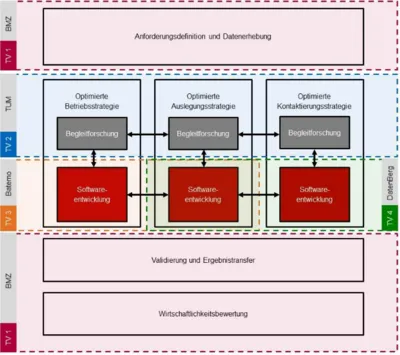ultraBatt - Intelligent Design and Operating Strategies for Ultra-Fast Chargeable Battery Systems in Electric Vehicles
Contact: Kareem Abo Gamra, M.Sc., Christian Allgäuer, Dipl.-Ing.
Problem
A central element for the transformation to a sustainable mobility system is the electrification of convential vehicle drivetrains. This is especially challenging in the commercial vehicle sector due to higher requirements regarding range and payload. To achieve this, high capacity energy storage systems are necessary, for which contemperary battery technologies pose several limitations compared to convential drive systems, such as high investment costs and weights. These economic disadvantages are further exacerbated by long idle times due to slow charging processes. It is therefore of high importance to develop ultra-fast chargeable battery systems without excessively compromising achievable lifetimes to secure long-term competitiveness of electric vehicles within the private and commercial mobility sectors.
Goal
The aim of the research project ultraBatt is to utilize electro-chemical battery models to develope a battery system prototype that can be charged from 10 % to 80 % state-of-charge in less than 15 minutes while achieving longer lifetimes than conventionally designed battery systems. For this purpose, the short- and longterm behavior of single cells within a battery system is simulated to enable an optimal system design regarding charging speed and lifetime. The three strategic areas operating limits, cell assembly and cell contacting are examined to utilize previously untapped potential and approach the problem along the entire value chain. By implementing a prototype the developed concept is experimentally validated to identify future areas of development. Finally, an economical and ecological evaluation of the concept is performed based on exemplary commercial use cases to examine the resulting implications for operation and infrastructure.






